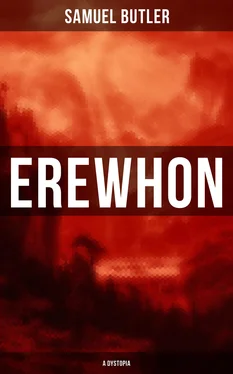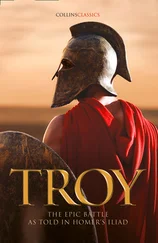A second article on the same subject as the one just referred to appeared in the Press shortly after the first, but I have no copy. It treated Machines from a different point of view, and was the basis of Chapter XXIII of the present edition of “Erewhon.” This view ultimately led me to the theory I put forward in “Life and Habit,” published in November 1877. I have put a bare outline of this theory (which I believe to be quite sound) into the mouth of an Erewhonian philosopher in Chapter XXVII of this book.
In 1865 I rewrote and enlarged “Darwin among the Machines” for the Reasoner, a paper published in London by Mr. G. J. Holyoake. It appeared July 1, 1865, under the heading, “The Mechanical Creation,” and can be seen in the British Museum. I again rewrote and enlarged it, till it assumed the form in which it appeared in the first edition of “Erewhon.”
The next part of “Erewhon” that I wrote was the “World of the Unborn,” a preliminary form of which was sent to Mr. Holyoake’s paper, but as I cannot find it among those copies of the Reasoner that are in the British Museum, I conclude that it was not accepted. I have, however, rather a strong fancy that it appeared in some London paper of the same character as the Reasoner, not very long after July 1, 1865, but I have no copy.
I also wrote about this time the substance of what ultimately became the Musical Banks, and the trial of a man for being in a consumption. These four detached papers were, I believe, all that was written of “Erewhon” before 1870. Between 1865 and 1870 I wrote hardly anything, being hopeful of attaining that success as a painter which it has not been vouchsafed me to attain, but in the autumn of 1870, just as I was beginning to get occasionally hung at Royal Academy exhibitions, my friend, the late Sir F. N. (then Mr.) Broome, suggested to me that I should add somewhat to the articles I had already written, and string them together into a book. I was rather fired by the idea, but as I only worked at the MS. on Sundays it was some months before I had completed it.
I see from my second Preface that I took the book to Messrs. Chapman & Hall May 1, 1871, and on their rejection of it, under the advice of one who has attained the highest rank among living writers, I let it sleep, till I took it to Mr. Trübner early in 1872. As regards its rejection by Messrs. Chapman & Hall, I believe their reader advised them quite wisely. They told me he reported that it was a philosophical work, little likely to be popular with a large circle of readers. I hope that if I had been their reader, and the book had been submitted to myself, I should have advised them to the same effect.
“Erewhon” appeared with the last day or two of March 1872. I attribute its unlooked-for success mainly to two early favourable reviews—the first in the Pall Mall Gazette of April 12, and the second in the Spectator of April 20. There was also another cause. I was complaining once to a friend that though “Erewhon” had met with such a warm reception, my subsequent books had been all of them practically still-born. He said, “You forget one charm that ‘Erewhon’ had, but which none of your other books can have.” I asked what? and was answered, “The sound of a new voice, and of an unknown voice.”
The first edition of “Erewhon” sold in about three weeks; I had not taken moulds, and as the demand was strong, it was set up again immediately. I made a few unimportant alterations and additions, and added a Preface, of which I cannot say that I am particularly proud, but an inexperienced writer with a head somewhat turned by unexpected success is not to be trusted with a preface. I made a few further very trifling alterations before moulds were taken, but since the summer of 1872, as new editions were from time to time wanted, they have been printed from stereos then made.
Having now, I fear, at too great length done what I was asked to do, I should like to add a few words on my own account. I am still fairly well satisfied with those parts of “Erewhon” that were repeatedly rewritten, but from those that had only a single writing I would gladly cut out some forty or fifty pages if I could.
This, however, may not be, for the copyright will probably expire in a little over twelve years. It was necessary, therefore, to revise the book throughout for literary inelegancies—of which I found many more than I had expected—and also to make such substantial additions as should secure a new lease of life—at any rate for the copyright. If, then, instead of cutting out, say fifty pages, I have been compelled to add about sixty invitâ Minervâ—the blame rests neither with my publisher nor with me, but with the copyright laws. Nevertheless I can assure the reader that, though I have found it an irksome task to take up work which I thought I had got rid of thirty years ago, and much of which I am ashamed of, I have done my best to make the new matter savour so much of the better portions of the old, that none but the best critics shall perceive at what places the gaps of between thirty and forty years occur.
Lastly, if my readers note a considerable difference between the literary technique of “Erewhon” and that of “Erewhon Revisited,” I would remind them that, as I have just shown, “Erewhon” look something like ten years in writing, and even so was written with great difficulty, while “Erewhon Revisited” was written easily between November 1900 and the end of April 1901. There is no central idea underlying “Erewhon,” whereas the attempt to realise the effect of a single supposed great miracle dominates the whole of its successor. In “Erewhon” there was hardly any story, and little attempt to give life and individuality to the characters; I hope that in “Erewhon Revisited” both these defects have been in great measure avoided. “Erewhon” was not an organic whole, “Erewhon Revisited” may fairly claim to be one. Nevertheless, though in literary workmanship I do not doubt that this last-named book is an improvement on the first, I shall be agreeably surprised if I am not told that “Erewhon,” with all its faults, is the better reading of the two.
SAMUEL BUTLER.
August 7, 1901
Table of Contents
If the reader will excuse me, I will say nothing of my antecedents, nor of the circumstances which led me to leave my native country; the narrative would be tedious to him and painful to myself. Suffice it, that when I left home it was with the intention of going to some new colony, and either finding, or even perhaps purchasing, waste crown land suitable for cattle or sheep farming, by which means I thought that I could better my fortunes more rapidly than in England.
It will be seen that I did not succeed in my design, and that however much I may have met with that was new and strange, I have been unable to reap any pecuniary advantage.
It is true, I imagine myself to have made a discovery which, if I can be the first to profit by it, will bring me a recompense beyond all money computation, and secure me a position such as has not been attained by more than some fifteen or sixteen persons, since the creation of the universe. But to this end I must possess myself of a considerable sum of money: neither do I know how to get it, except by interesting the public in my story, and inducing the charitable to come forward and assist me. With this hope I now publish my adventures; but I do so with great reluctance, for I fear that my story will be doubted unless I tell the whole of it; and yet I dare not do so, lest others with more means than mine should get the start of me. I prefer the risk of being doubted to that of being anticipated, and have therefore concealed my destination on leaving England, as also the point from which I began my more serious and difficult journey.
Читать дальше












